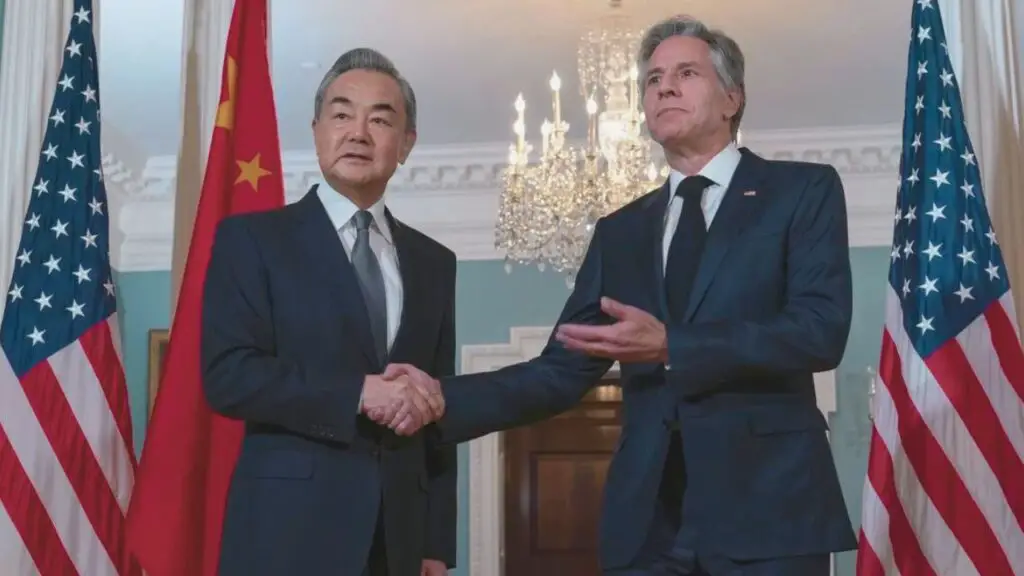China’s Foreign Minister Expects Challenges Ahead for Meeting with President Biden
China’s Foreign Minister, Wang Yi, has expressed that the road to an expected meeting between President Xi Jinping and U.S. President Joe Biden will not be without obstacles, and both countries must collaborate to achieve meaningful results. The Chinese Foreign Ministry made this statement on Sunday following Wang Yi’s three-day visit to Washington, where he met President Biden, Secretary of State Antony Blinken, and National Security Advisor Jake Sullivan. In an effort to foster dialogue and cooperation, both sides have agreed to work towards a bilateral meeting at the upcoming Asia-Pacific Economic Cooperation forum summit in San Francisco in November.
Amidst the backdrop of high tensions between the two countries, particularly concerning U.S. export controls on advanced technology and China’s assertive actions in the East and South China seas, Wang Yi emphasizes that the path towards the bilateral meeting cannot rely on autopilot. In a statement summarizing his discussions with members of the “U.S. strategic community,” Wang Yi acknowledged the necessity to overcome obstacles and eliminate interference in order to enhance the consensus and accumulate results.
Working Towards Dialogue in the Face of Global Conflicts
The meeting between Wang Yi and President Biden is part of a series of high-level contacts aimed at stabilizing the relationship between the two countries in the midst of conflicts in Ukraine and Israel. The Foreign Ministry statement highlights the importance of a “return to Bali,” referencing a previous meeting between President Xi and President Biden at a G-20 summit last year. During that summit, the two leaders addressed issues such as Taiwan, U.S.-China trade tensions, climate change, health, and food security.
Wang Yi underlines that both China and the U.S. must continue dialogue to navigate the complex web of challenges. Despite the many issues that still need resolution, maintaining a beneficial and necessary dialogue between the two countries remains a shared belief.
Exploring Multiple Facets of Cooperation
The discussions between Wang Yi and President Biden extended beyond political tensions, encompassing military exchanges, as well as financial, technological, and cultural cooperation. These exchanges aim to foster stronger ties between the U.S. and China, recognizing the potential for mutual benefits in various fields.
As the world grapples with several ongoing crises, including those in West Asia and Ukraine, the meeting between Wang Yi and President Biden signifies a commitment to addressing global challenges. Both nations understand the importance of working together to find common ground and establish productive partnerships.
Challenges Ahead for the Anticipated Meeting
Wang Yi’s visit to Washington and the subsequent discussions with President Biden reflect the complexities surrounding China-U.S. relations. While both sides acknowledge the necessity for dialogue, they also recognize the challenges lying ahead.
The tensions between China and the U.S. are multifaceted, ranging from disagreements over trade policies to geopolitical disputes in critical regions. U.S. export controls on advanced technology and China’s assertive actions in maritime territories have been particularly contentious issues. These complexities necessitate a proactive approach towards problem-solving and collaboration.
The upcoming bilateral meeting at the Asia-Pacific Economic Cooperation forum summit in November presents an opportunity for both countries to navigate these challenges. However, as Wang Yi emphasizes, relying on “autopilot” – passive and routine approaches – will not suffice. The path forward requires active engagement, elimination of interference, and the accumulation of meaningful results.
The Significance of Dialogue in the Face of Diverse Conflicts
The timing of Wang Yi’s visit to Washington and his meeting with President Biden is noteworthy as it coincides with conflicts in Ukraine and Israel. The intention behind these high-level contacts is to stabilize the increasingly tense relationship between China and the U.S. within the broader global context.
The previous meeting between President Xi and President Biden at the G-20 summit in Bali holds significance in this regard. It served as a platform to address various pressing issues and explore avenues of cooperation. Wang Yi’s reference to a “return to Bali” signifies the relevance of building upon past discussions and reaffirming the commitment to tackle shared challenges.
Navigating Obstacles for a Fruitful Relationship
The statement emphasizes that the road towards a successful China-U.S. bilateral meeting is unlikely to be “smooth sailing.” Both countries must confront obstacles head-on and work together to maintain dialogue and cooperation.
While there are still many hurdles to overcome, the benefits of collaboration between China and the U.S. are clear. Enhancing interdependence in areas such as trade, technology, and geopolitical stability is crucial for the present and future well-being of both nations.
To reinforce these objectives, it is vital to eliminate interference and establish common ground. This requires concerted efforts and a proactive approach from both sides.
Beyond Political Dialogue
The discussions between Wang Yi and President Biden went beyond political tensions, encompassing multifaceted exchanges. Military cooperation, along with cultural, technological, and financial exchanges, highlights the potential breadth and depth of the relationship between China and the U.S.
Recognizing the importance of fostering stronger ties between two of the world’s largest economies, diplomatic efforts are underway to promote collaboration across various sectors. This approach extends beyond immediate political concerns and opens doors to long-term cooperation.
Conclusion
The meeting between Wang Yi and President Biden serves as a crucial step in navigating the nuanced relationship between China and the U.S. It signifies a commitment to dialogue, collaboration, and the pursuit of mutually beneficial outcomes. Despite the challenges that lie ahead, both countries acknowledge the importance of overcoming obstacles and enhancing consensus.
As the world faces ongoing conflicts and global crises, such diplomatic efforts are essential for fostering stability and addressing common challenges. By eliminating interference and strengthening cooperation in areas such as trade, technology, and geopolitical stability, China and the U.S. can work towards a fruitful relationship that sets the foundation for a more harmonious global order.

